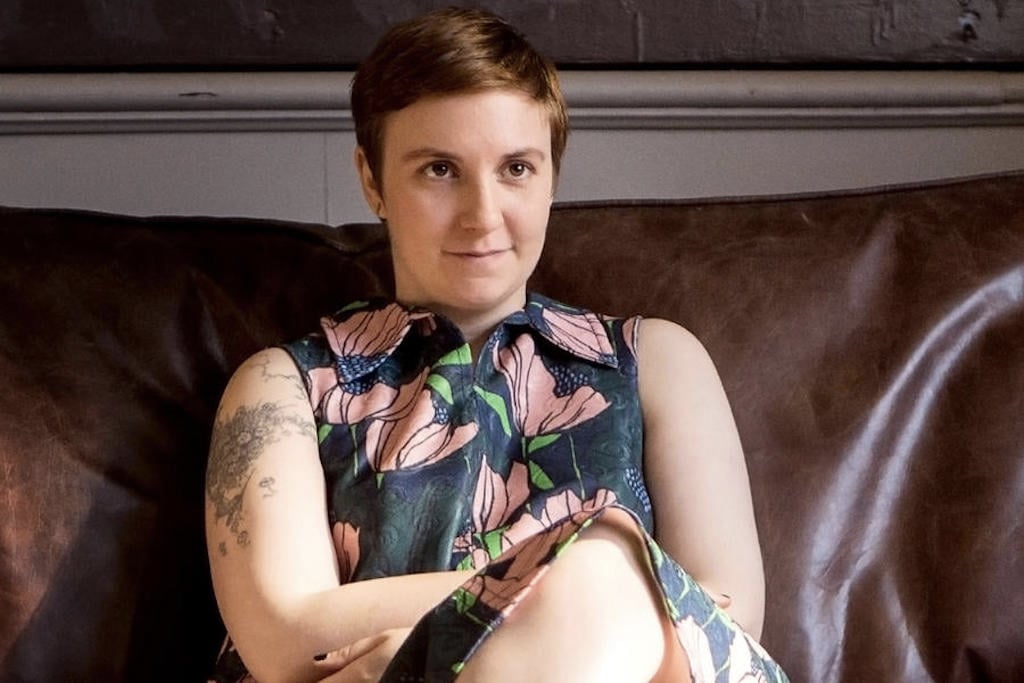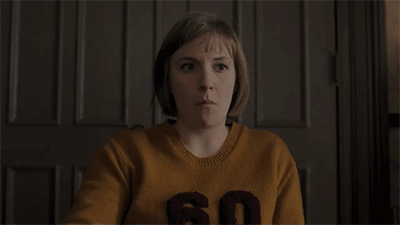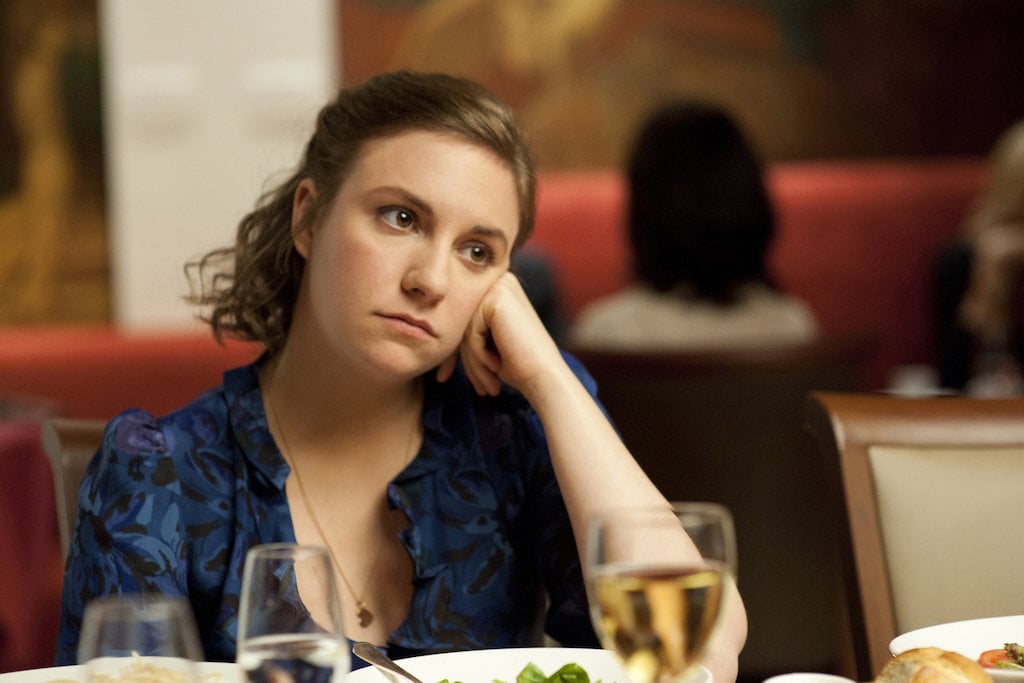Oh God, Lena Dunham Said A Thing Again
A guide to the latest outrage cycle.

Hi, it’s happened again! Bad words have spilled from Lena Dunham’s mouth and spread all over the internet. People are very mad, and rightfully so. The words are not good.
But it’s a controversy that feels all the more exhausting given its timing. With just over a week left in this emotional marathon of a year, for many, the necessary outrage to respond to this kind of stuff — or meaningfully engage with said outrage — is lacking.
At this point, what more can be said? Does anyone still need to be convinced of Dunham’s flaws? Is the outrage and anger still useful?
it is with a heavy heart that i must announce Lena Dunham is at it again
— Patrick Monahan (@pattymo) December 20, 2016
So What Actually Happened?
Lena Dunham’s latest episode of Women of the Hour (her podcast co-produced with BuzzFeed) was centred on the theme of reproductive choice. In line with the format of the show, she spoke to a number of people from different backgrounds who have experiences with the matter — “a woman with no children, a mother of ten children, and everything in between!”.
As she is an extremely vocal proponent of Planned Parenthood, Dunham also spoke about her own experiences fighting in defence of abortion. And that’s where things went bad.
“I’ve always thought that I myself didn’t stigmatise abortion,” she said. “I’m an abortion rights activist, it’s a huge part of who I am. But one day, when I was visiting a Planned Parenthood in Texas, and young girl walked up to me and asked if I’d like to be part of her project where women share stories of their abortions. I sort of jumped. ‘I haven’t had an abortion,’ I told her. I wanted to make it really clear to her that as much as I was going out and fighting for other women’s options, I myself had never had an abortion.”
Dunham then talked about the realisation she had internalised some of the stigma she fights. “Even I, the woman who cares as much as anybody, wanted people to know that I was unblemished in this department,” she said.
Then, after praising the “bravery and self knowledge” other women in her life have had when dealing with their own abortions, she said this:
“Now I can say that I haven’t had an abortion, but I wish I had.”

What’s Wrong With This?
I mean… okay. The most basic flaw in Dunham’s statement is that it venerates the act of abortion rather than the freedom of choice that allows it. Being pro-choice is not about loving abortions (in fact that’s a harmful slur often used against pro-choice feminists!).
Her logic treats the medical act as some kind of self-actualising ritual that makes a woman strong and determined. That may be incidentally true for few who go through it, but to wish an abortion on yourself to attain this is to greatly undermine the conflict, pain and suffering that the procedure brings to many others.
.@lenadunham FYI an abortion is not something you "get to have." It's an awful experience one SHOULDN'T wish for like a gift from Santa ??
— s a s h a (@kisslow) December 20, 2016
@jtLOL Normally I roll my eyes at Dunham’s silliness, but this made me so angry. An abortion isn’t something you get bc it’s “on trend.”
— ☃️Jingle Jess ☃️ (@TheSenator) December 20, 2016
Then there’s the self-aggrandising element to it — the idea that Dunham is such a strong activist, such a worthwhile ally that she would wish this upon herself; that such an act would in turn somehow help others.
“Even I, the woman who cares as much as anybody…” she said before the offending comment. Even Lena Dunham!
Well meaning as this is, it’s an attitude that could only ever be taken by someone with oceans of privilege. Lena Dunham speculatively celebrating the experience of having an abortion definitely helps Lena Dunham more than it does the teenage girl trying to covertly hustle cash together for a procedure hidden from her conservative or religious parents, or the woman arguing her case to a belligerent doctor then travelling to another state to dodge outdated laws, or anyone simply enduring the physical pain of a surgical procedure or the chemical effects of RU-486.
These women don’t wish this upon anyone.
Lena Dunham wishing she had an abortion is like when youre 10 & you wish you had a cast on your arm. Except youre not a kid youre an asshole
— KFC (@KFCBarstool) December 20, 2016
The Dunham Problem
Each Dunham controversy is essentially the same problem through a slightly different lens. She was ignorant of the need for diversity on her show. She was ignorant of how casually Islamophobic or Orientalist tweets and stories and photos could be harmful or offensive to her fans. She was ignorant of the way her comments about Odell Beckham Jr fed into harmful stereotypes of black men.
Like her on-screen Girls caricature complaining about “struggle”, like Amy Schumer doing a ‘Formation’ pisstake with Goldie Hawn, like Jennifer Lawrence telling stories about rubbing her ass on sacred Hawaiian rocks, she is ignorant.
But it’s an ignorance which hits harder still given her vast (and often incredibly useful) platforms. For all its faults, Girls has increasingly proved itself a heart-wrenching and compelling portrait of twentysomething malaise and dealt with some sensitive issues in fresh and nuanced ways. Both her podcast and newsletter, Lenny, have showed earnest effort to atone her blind spots and support the work and views of many more diverse women. Days before the federal election, after enjoying a prominent place in the campaign for Hillary, she was satirising herself with a pantsuit rap on Funny or Die.
Dunham repeatedly takes one step forward and ten steps back.
I kind of thought that Lena Dunham was going to be our generation's Woody Allen, but it turns out she's our generation's Woody Allen.
— JenAshleyWright (@JenAshleyWright) December 20, 2016
I wish I didn't like Girls. Lena Dunham is a total mess. she makes me feel ashamed for liking her show.
— Larry Harris, Jr (@LarryHarrisJr) December 20, 2016
So what do with the controversy (and the inevitable ones to come like it)?
Firstly, you can make a decision about the work you want to support. If you find Lena Dunham’s views and actions objectionable and no longer wish to bolster her creative work as a result, that is okay. It is also, incidentally, okay to continue engaging in her creative work. There are many reasons to support some of the work she does, and to do so with consideration of her flaws is a perfectly valid choice.
Secondly, we should cut out and call out abuse. Lena Dunham has become such a uniquely hated figure across the political spectrum that each of these moments brings with it a deluge of terrible and largely unchecked online vitriol. It’s incredibly important to share a diversity of views around a topic like this and they absolutely should be filled with passion, but when that breaches into all-out slurs or gender-based attacks on appearance, it loses its point.
lena dunham is a cancer to society
— jolly duley ☃️ (@Advil) December 20, 2016
lena dunham's mom didn't have an abortion, but i wish she had pic.twitter.com/73ejMBfVJd
— AlexJonestownMassacr (@TrumpHat) December 20, 2016
Dear Lena Dunham,
In order to have an abortion you first have to find someone willing to sleep with you
Sincerely,
Everyone— Matthew Kick (@MatthewKick) December 20, 2016
It could be that, beyond calling out the initial problem, the most productive thing to do is simply demand more — from Dunham, women like her, and the platforms they’re given undue representation on (we’ve absolutely been guilty of this in the past). The end of this garbage year seems like as good a time as any to re-evaluate what we want and need from high-profile feminists and where we should look to find more of them.
